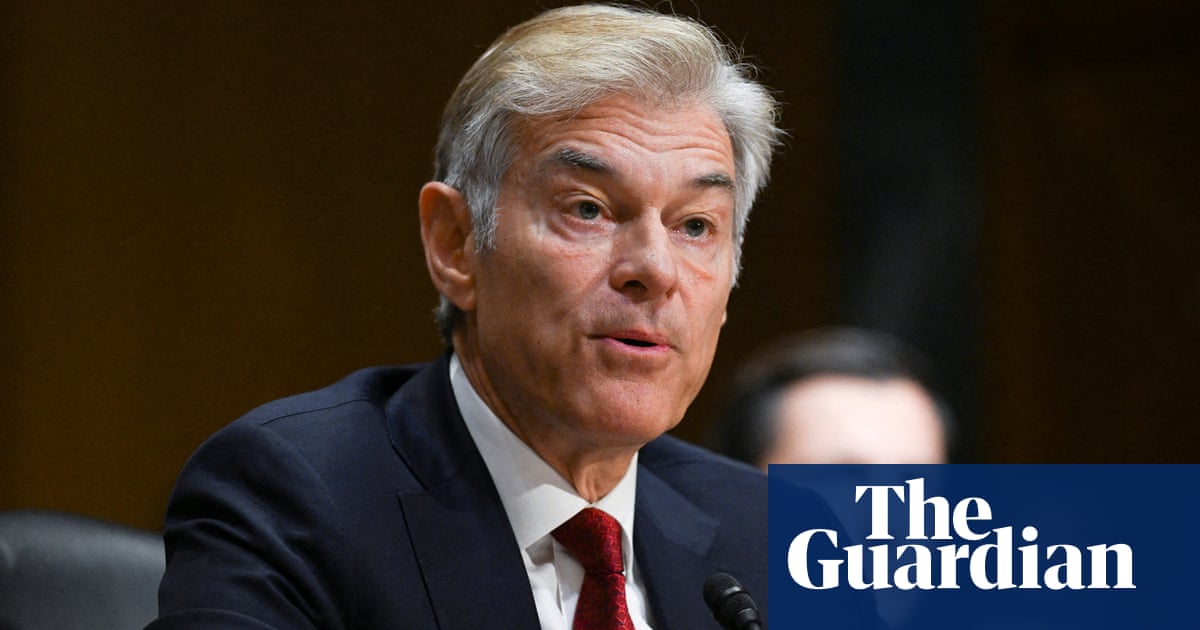
Stock Exchange closes on worst day since 2020 but Trump insists stocks will 'boom'
The New York stock exchange has closed on its worst day of trading since June 2020 – during the early months of the Covid-19 pandemic.
The main indices saw their worst one-day falls in five years as Donald Trump claimed that “the markets are going to boom” in response to his sweeping tariffs.
The S&P 500 index is down 4.9% at the close, which Reuters flags is the biggest one-day drop since June 2020.
The Dow has also posted its biggest one-day drop since June 2020, down 4%.
Meanwhile, the Nasdaq tumbled 5.9%, its worst single-day performance since March 2020.
The scale of the sell-off, wiping trillions of dollars off the value of US companies, highlights just how alarmed investors are by the tariffs, and the fears they could lead to a recession.
Speaking to reporters earlier on Thursday, Trump denied market turmoil presented a problem. The president said:
I think it’s going very well. It was an operation like when a patient gets operated on and it’s a big thing. I said this would be exactly the way it is … We’ve never seen anything like it. The markets are going to boom. The stock is going to boom. The country is going to boom.
Key events Show key events only Please turn on JavaScript to use this feature
The head of the International Monetary Fund says Donald Trump’s “reciprocal” tariffs “clearly represent a significant risk to the global outlook”.
“It is important to avoid steps that could further harm the world economy,” said IMF managing director Kristalina Georgieva. “We appeal to the United States and its trading partners to work constructively to resolve trade tensions and reduce uncertainty.”
The fund will meet with the World Bank later this month to discuss global economic issues, including the recent US tariffs.
Gabrielle Canon
The Trump Administration is reportedly now taking aim at Brown University, widening its threats to withhold federal funding for schools deemed to be in conflict with its edicts.
As the fifth university to potentially face a financial hit from the administration, Brown stands to lose $510 million over several years, the NYT reported Thursday, a sizable blow that could seriously impact research.
Brown administrators have not confirmed the news, which was first published by the right-wing website The Daily Caller. But provost Frank Doyle said the university was aware of “troubling rumors emerging about federal action on Brown research grants,” in an email sent to school officials.
From the NYT:
Like many of its Ivy League peers, Brown was the site of clashes over the war in Gaza. But it was also one of a small number of universities that made deals with students to end their protest encampments in the spring, agreements that came under criticism for being too soft on students.
Brown became one of only a handful of universities to agree to a board vote on divesting from Israel. The Brown Corporation, the school’s governing board, ultimately voted against divestment, saying it held no direct investments in companies protesters had named as having ties to Israel.”
In recent weeks, as other universities faced backlash over their perceived acquiescence to the Trump Administration, Brown’s leaders spoke out, vowing steadfast commitment to their academic freedoms.
In a letter shared publicly on the university’s site, President Christina H. Paxson promised that Brown would not buckle under pressure.
“The nation has witnessed what many in higher education fear may be only the first examples of unprecedented government demands placed on a private university as a condition for restoring federal funding,” she said.
Paxson outlined three core values and the school’s response to protect them: following the law, defending academic freedom and freedom of expression, and a commitment to providing resources to international community members.
“If Brown faced such actions directly impacting our ability to perform essential academic and operational functions,” she said, “we would be compelled to vigorously exercise our legal rights to defend these freedoms, and true to our values, we would do so with integrity and respect.”
19 Democratic AGs sue Trump over elections EO

Lauren Gambino
A coalition of 19 Democratic attorneys general filed a lawsuit against the Trump administration on Thursday, arguing that a recent executive order signed by the president seeking to overhaul the nation’s elections was unconstitutional.
The lawsuit accuses the president of overstepping his authority with last week’s action, which they say amounts to an ”unconstitutional, antidemocratic, and un-American attempt to impose sweeping voting restrictions across the country”.
The lawsuit is the latest challenge to the president’s order, which includes proof-of-citizenship requirements for voter registration and new ballot deadline rules. the order threatens states that don’t comply with federal funding cuts.
It lists President Trump, the attorney general Pam Bondi as defendants. The attorneys general are asking a judge to declare the provisions “unconstitutional and void”.
“My fellow attorneys general and I are taking him to court because this Executive Order is nothing but a blatantly illegal power grab and an attempt to disenfranchise voters, California attorney general Rob Bonta said in a statement. “Neither the Constitution nor Congress authorize the President’s attempted voting restrictions. We will not be bullied by him. We will fight like hell in court to stop him.”
Trump’s elections order also faces legal challenges brought by the Democratic National Committee, the Democratic Governors Association, and Senate and House Democratic leaders, as well as a separate lawsuit filed by two nonprofit organizations, The Campaign Legal Center and the State Democracy Defenders Fund. Both of these lawsuits were filed in the US district court for the District of Columbia.
When Trump signed the order, Will Scharf, the White House staff secretary, called the order “the farthest-reaching executive action taken” in the country’s history.
Despite Trump’s public anti-tax stance, his decision to sharply increase tariffs would amount to the largest tax hike in decades, Reuters reports.
The intel comes from a JP Morgan note, which concluded that the tariffs account for a 22% increase and warns that “sustained restrictive trade policies and reduced immigration flows may impose lasting supply costs that will lower U.S. growth over the long run”.
Trump’s trade policies have spiked risks of a global recession according to the bank, which raised chances to 60% from 40%.
The US stock market closed today on the worst day of trading since 2020, with all three major index funds down as Apple and Nvidia lost a combined $470bn.
Our colleagues have more on the financial fallout of Donald Trump’s massive “reciprocal” tariffs announced yesterday:
Today so far
Thanks for joining our coverage of US politics, and particularly the fallout from Donald Trump’s “reciprocal” tariffs announcement yesterday. Here are the key headlines we’ve been following so far today:
-
The New York stock exchange closed on its worst day of trading since June 2020 – during the early months of the Covid-19 pandemic. The main indices saw their worst one-day falls in five years as Donald Trump claimed that “the markets are going to boom” in response to his sweeping tariffs.
-
Canada will retaliate against “unjustified, unwarranted” tariffs imposed by the United States with a 25% taxes on US vehicles, Mark Carney announced on Thursday. The US has placed 25% taxes on Canadian steel, aluminum and vehicles.
-
Mitch McConnell, the Kentucky Republican senator and former Senate majority leader, has criticized Donald Trump’s latest tariffs, saying that they are “bad policy and trade wars with our partners hurt working people most”. Trump told reporters aboard Air Force One today that tariffs on imported semiconductor chips and pharmaceuticals will be coming “soon”.
-
The US agriculture secretary Brooke Rollins said that the administration is “months away” from making a decision about whether to make payments to farmers to offset any impact from tariffs. Donald Trump’s sweeping tariffs were mostly criticized by farm and food groups for their potential to shrink markets for farmers and raise prices for consumers.
-
A federal judge said she will temporarily block the Trump administration from cutting $11bn in federal public health funding. US District Judge Mary McElroy in Rhode Island said she will approve a temporary restraining order while hearing a case brought by 23 states and the District of Columbia.
-
Mike Pence will receive the John F Kennedy Profile in Courage Award in May for his refusal to go along with the 6 January attack on the US Capitol. The JFK Library Foundation shared the announcement today, saying the award will recognize Trump’s former vice-president “for putting his life and career on the line to ensure the constitutional transfer of presidential power on Jan. 6, 2021.”
-
The Pentagon’s inspector general’s office announced it was opening an investigation into defense secretary Pete Hegseth’s use of an unclassified commercial texting application to coordinate the 15 March launch of US strikes on Yemen’s Houthis. Hegseth outlined details of a US airstrike in Yemen in a Signal group chat that included the vice-president, JD Vance, as well as Trump’s national security adviser, Mike Waltz, who mistakenly added Jeffrey Goldberg, editor-in-chief of the Atlantic, to the chat.
-
Several members of Donald Trump’s embattled national security council have been fired, Axios reports. The firings come a day after conspiracy theorist Laura Loomer visited the Oval Office and pressed Trump to fire specific NSC staffers for disloyalty.
-
US secretary of state Marco Rubio told Nato allies on Thursday that Washington remained committed to the alliance but expected them to spend far more on defence and would give them some time to do so. Rubio met fellow Nato foreign ministers gathered in Brussels, with some European officials saying they were reassured by the renewed commitment to the alliance at a time of rising tensions over Trump’s new trade tariffs.
A federal judge said she will temporarily block the Trump administration from cutting $11bn in federal public health funding.
US District Judge Mary McElroy in Rhode Island said she will approve a temporary restraining order while hearing a case brought by 23 states and the District of Columbia.
New York Attorney General Letitia James reacted to the judge’s decision on social media, saying: “We’re going to continue our lawsuit and fight to ensure states can provide the medical services Americans need.”
The $11bn in cuts that the Trump administration had proposed would have predominantly affected funding for Covid-19 related initiatives, mental health and substance use treatment.
While speaking with reporters aboard Air Force One, Trump also mentioned tariffs could give him the power to make a deal with China over TikTok.
“We have a situation with TikTok where China will probably say we’ll approve a deal but will you do something on the tariffs. The tariffs give us great power to negotiate,” he said. He then clarified that he was not currently in talks with China and was just using TikTok as an example.
He added “we’re very close to a deal with a very good group of people” with “multiple” investors interested in the social media platform.
Donald Trump told reporters aboard Air Force One today that tariffs on imported semiconductor chips and pharmaceuticals will be coming “soon”.
He added that the “reciprocal” tariffs he announced yesterday have put the US “in the drivers seat.”
“Every country is calling us. That’s the beauty of what we do,” he said. “If we would have asked these countries to do us a favor. They would have said no. Now they will do anything for us.”
The Senate has confirmed Mehmet Oz – a former heart surgeon and TV personality – as the administrator of the Centers for Medicare and Medicaid Services.
Oz will take the lead at the agency, which provides health care coverage to more than 160 million Americans – but which is facing significant changes as Congress debates cuts to the Medicaid coverage.
For more, read on below:










 English (US)
English (US)